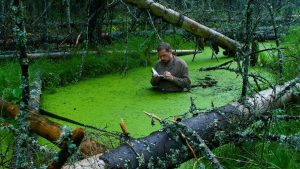Riga International Biennial of Contemporary Art (RIBOCA), a major new biennial in Riga, Latvia, is pleased to announce the artists who will participate in the first edition. Entitled ‘Everything Was Forever, Until It Was No More’, the chief curator of RIBOCA1 Katerina Gregos, who has been instrumental in setting up the biennial alongside founder and commissioner Agniya Mirgorodskaya.
A total of 99 artists including 10 collectives will be participating in the biennial.
Almost a third of the participating artists are from the Baltic countries, while almost 70% of the total are from the Baltic region (including Poland, Sweden, Denmark, Finland and Germany). The rest of the artists come from countries as diverse as Korea, Argentina, Venezuela, Colombia, South Africa, the United States and Canada, as well as Russia, Belgium, the Netherlands, Spain, Portugal, Switzerland, Greece, Bulgaria and the United Kingdom.
During the biennial 113 works – including 49 new commissions – will be shown in nine different venues across Riga. There will also be 10 public sculptures and site-specific interventions in various locations around the city. Many of the participating artists will present more than one work, appearing in several of the venues, thus providing an opportunity for visitors to gain a more in-depth insight into their practice.
The artists participating in the public programme and making performances will be announced at later date.
Participating artists
ASI* (The Agency of Singular Investigations), Russia (founded 2014)
Alexis Blake, USA/Netherlands (b.1981)
Alexis Destoop, Belgium/Australia (b.1971)
Adrián Villar Rojas, Argentina (b.1980)
Andrejs Strokins*, Latvia (b.1984)
Andris Eglītis*, Latvia (b.1981)
Annaïk-Lou Pitteloud, Switzerland/Belgium (b.1980)
Anne Duk Hee Jordan, Korea/Germany (b.1978)
Ariane Loze*, Belgium (b.1988)
Aslan Gaisumov, Chechnya (b.1991)
Augustas Serapinas*, Lithuania (b.1990)
Clemens von Wedemeyer*, Germany (b.1974)
Diana Lelonek, Poland (b.1988)
Diāna Tamane*, Latvia/Belgium (b.1986)
Emilija Škarnulytė, Lithuania/Germany (b.1987)
Erik Kessels*, Netherlands (b.1966)
Ēriks Apaļais, Latvia (b.1981)
Eve Kiiler, Estonia, (b.1960)
Femke Herregraven*, Netherlands (b.1982)
Fernando Sánchez Castillo, Spain (b.1970)
Han Hoogerbrugge, Netherlands (b.1963)
Hannah Anbert*, Denmark (b.1984)
Hans Rosenström*, Finland (b.1978)
Henrike Naumann*, Germany (b.1984)
IC-98, Finland (founded 1998)
Ieva Balode, Latvia (b.1981)
Ieva Epnere*, Latvia (b.1977)
Indrė Šerpytytė*,Lithuania/UK (b.1983)
Ivar Veermäe, Estonia/Germany (b.1982)
Jacob Kirkegaard, Denmark (b.1975)
James Beckett, Zimbabwe/Netherlands (b.1977)
Jani Ruscica, Finland (b.1978)
Johanna Gustafsson-Fürst, Sweden (b.1973)
Johannes Heldén, Sweden (b.1978) &
Håkan Jonson, Sweden (b.1978)
Jonas Mekas, Lithuania/USA (b.1922)
Julian Charrière, France (b.1987)
Julian Rosefeldt, Germany (b.1965)
Julijonas Urbonas, Lithuania (b.1981)
Karel Koplimets*, Estonia (b.1986)
Katarzyna Przezwańska, Poland (b.1984)
Katrīna Neiburga, Latvia (b.1978)
Kerstin Hamilton*, Sweden (b.1978)
Kristaps Epners*, Latvia (b.1976)
Kustaa Saksi, Netherlands (b.1975)
Liina Siib*, Estonia (b.1963)
Lynn Hershman-Leeson, USA (b.1941)
Maarten Vanden Eynde*, Belgium (b.1977)
Marco Montiel-Soto, Venezuela/Germany (b.1976)
Marge Monko*, Estonia (b.1976)
Marina Pinsky*, Russia/Belgium (b.1986)
Marisa Benjamim, Portugal/Germany (b.1981)
Mark Dion*, USA (b.1961)
Maryam Jafri, Pakistan/Denmark (b.1972)
Melanie Bonajo, Netherlands, (b.1978)
Michael Landy*, UK (b.1963)
Michael Sailstorfer*, Germany (b.1979)
Minna Rainio & Mark Roberts, Finland/UK (b.1974, b.1970)
Nabil Boutros, Egypt/France (1954)
Nedko Solakov*, Bulgaria (b.1957)
Nicolas Kozakis, Greece/Belgium (b.1967) & Raoul Vaneigem, Belgium (b.1934)
Nikos Navridis*, Greece (b.1958)
Oswaldo Maciá*, Colombia/UK (b.1960)
Orbita, Latvia (founded 1999)
Paulis Liepa*, Latvia (b.1978)
Petra Bauer, Sweden (b.1970) & Rebecka Katz-Thor*, Sweden (b.1982)
Robert Kuśmirowski*, Poland (b.1973)
Sandra Kosorotova*, Estonia (b.1984)
Sasha Huber, Switzerland/Finland (b.1975) & Petri Saarikko*, Finland (b.1973)
Saskia Holmkvist*, Sweden (b.1971)
Sissel Tolaas*, Norway/Germany (b.1963)
Sputnik photos*, Poland/Slovakia/Belarus (founded 2006 in Poland)
Stelios Faitakis*, Greece (b.1976)
Stine-Marie Jacobsen*, Denmark (b. 1977)
Sven Johne, Germany (b.1976)
Taus Makhacheva*, Dagestan (b.1983)
Teemu Korpela*, Finland (b.1980)
Tilman Wendland*, Germany (b.1969)
Tobias Zielony*, Germany (b.1973)
Trevor Paglen, USA (b.1974)
Valio Tchenkov*, Bulgaria/Germany (b.1966)
Vladimir Svetlov, Latvia (1973)
Viron Erol Vert*, Turkey/Germany (b.1975)
Jevgeni Zolotko*, Estonia (b.1983)
Žilvinas Landzbergas*, Lithuania (b.1979)
*An asterisk denotes a new commission
The title of first edition of RIBOCA, Everything Was Forever, Until It Was No More, is borrowed from the book written by the Russian author Alexei Yurchak of the same name. The book references the paradox of sudden but expected social and political change as it occurred in the Soviet Union. Taking the title of Yurchak’s book as a metaphor for the present moment of accelerated transitions, the exhibition will reflect on the process of change and how this is registered, anticipated, experienced, grasped, assimilated and dealt with at a time of rapid transformations.
As chief curator Katerina Gregos states, “Whereas many biennials and large-scale exhibitions recently have been quite retrospective – anachronistic, even – looking to the past and harking back to lost political and social utopias, the first edition of the Riga Biennial will set its eyes firmly on the present and the near future of the human condition as we approach the second quarter of the twenty first century. It will explore the shifts that have been taking place in the region but will also contextualize these into a broader picture, as the world is now decidedly interconnected. The biennial will be regional in its geopolitical focus but global in its examination of the issues that concern us all. From the personal to the political and social, to the philosophical and the existential, the Biennial will probe how contemporary artists are responding to some of the major challenges of the day, how they register change, and how they imagine the future. Riga seems to be the perfect place to do this, as a place that has often experienced pivotal change.”
Commissioned by Agniya Mirgorodskaya, the biennial prioritises sustainability in terms of the artistic economy and spectatorship, and promotes knowledge production through a significant public and educational programme consisting of talks, lectures, workshops, and reading groups – among other things – which will continue beyond the duration of the exhibition.
Press preview and Vernissage:
Wednesday 31 May – Saturday 2 June 2018
RIBOCA1 opens to public:
Saturday 2 June – Sunday 28 October 2018


